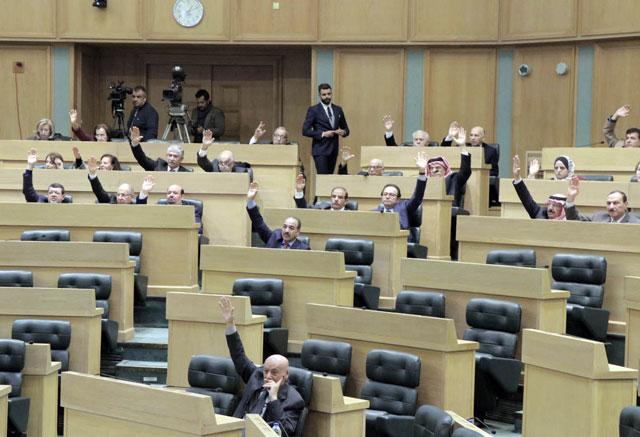You are here
Senate passes general pardon law, paving way for King’s ratification
By Raed Omari - Jan 29,2019 - Last updated at Jan 29,2019

The Upper House passes the 2019 general pardon law on Monday (Petra photo)
AMMAN — The Senate on Tuesday passed the 2019 general pardon law with no changes to the version referred from the Lower House.
Passed by the two Chambers of Parliament with no further disagreement, the law will be referred to the King for ratification and will then be published in the Official Gazette.
Senators had rejected MPs’ inclusion of the crimes against authorities as well as water and electricity violations in the general pardon law thus sending the draft bill back to the Lower House for reconsideration.
Deputies then endorsed senators’ amendments to exclude attacks on public employees and crimes related to the Water and Electricity Law from the bill, agreeing with the Upper House’s rationale that the decision sought to preserve the status of the state, especially since legal rights in such cases usually fall to the state rather than the victims.
The two Houses of Parliament also disagreed on pardoning residency violations to finally endorsing senators’ wording stipulating that foreigners residing in the Kingdom who violated the residency and foreigners affairs laws should rectify their status within 180 days of the date the law goes into effect to be exempted from fines.
Under the law, full exemptions from fines, penalties and disciplinary measures will be granted to crimes and violations committed before His Majesty King Abdullah’s directives to the government to issue the law on December 12, 2018.
When the law goes effective, all those detained or convicted in crimes pardoned in the law will be released upon an order from the general prosecutor office while the bill leaves it to the court to decide on crimes they still examine.
As per the provisions of the law, a committee headed by president of the Cassation Court with the membership of prosecutors general of the Amman Court of Appeal, the Supreme Criminal Court and the State Security Court, will examine all challenges against the law and will issue its verdicts by majority vote.
Minister of Justice Bassam Talhouni said earlier in January that up to 5,000 criminal acts would benefit from the general pardon law.
Talhouni said that the number of criminal acts excluded from the draft law was 187, pointing out that the number of beneficiaries from the pardon may reach some 8,000 people.
As worded by lawmakers, acts of defamation, slander and contempt stipulated in the Cybercrimes Law, violations to residency and foreigner affairs and the Labour laws, fines for breaches related to the Income, Sales and Customs laws in addition to traffic violation fines and drug-related crimes, with a number of exceptions, will also be pardoned regardless of whether victims’ private rights are waived or not.
However, the law requires that the victims drop their private rights in order for the following crimes to be pardoned: premeditated murder, manslaughter, embezzlement, counterfeiting and lying under oath.
Among crimes that would be excluded from the general pardon were those related to state security, forming or joining illegal organisations and espionage, in addition to espionage, economic crimes, graft, rape, terrorism and violations to the duties of public office.
The Lower House has recommended that a special pardon law be issued to include crimes not covered under the general pardon law in addition to finding ways to cover the accumulated debts of women and university students.
The general pardon law, as per the King’s directives, is aimed at “entrenching the concept of tolerance and forgiveness, enhancing societal security, easing hardship and pressures faced by citizens, giving convicts and wrongdoers a second chance to correct their conduct and encouraging them to play their natural role and ensure their permanent integration in society”.
Related Articles
AMMAN — The general pardon bill was passed by the Senate on Tuesday as referred by the Lower House, and is awaiting His Majesty King Abdulla
AMMAN — A Royal Decree was issued on Monday ratifying the 2019 general pardon Law as endorsed by the Senate and the Lower House, according t
AMMAN — The Lower House on Wednesday referred the general pardon draft law to its Legal Committee, granting it an “urgency status”, the Jord













